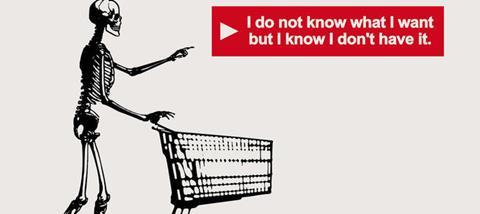
At the John Lewis distribution centre in the UK a robotic arm swoops down and picks out this year’s top selling game 'Pie Face', from a vast container containing the store’s 87,000 most popular products. As the robot drops Pie Face onto a conveyor belt human staff who pack at 55 items per hour take over. Meanwhile at the Amazon warehouse down the road a worker uses her sat-nav to work out the quickest route from the Sony TVs to the shelf that stocks Bratz dolls.
I was reading a newspaper article about transformations in shopping, and yes I’ve been shopping in the sales too. Most websites now will promise to deliver items ordered in the evening by next morning. This is what we demand. In surveys 96% of shoppers say they expect goods ordered online to arrive within 3 days. Amazon will already deliver within 1 hour in some locations, and you may even have seen the upcoming drones which are expected to cut delivery times to just minutes.
'It must fit me' culture
The staggering efficiency with which ordered items are delivered has also sparked new trends like 'shopping in your own home'. People order several items in the knowledge that at most they will purchase one - but it costs nothing to return unwanted items - so why not?
I remember as a child my mother telling me that UK high-street leader (in 1975!) Marks and Spencer would actually take back products just because they were unwanted. We thought that was revolutionary! But today our expectation is that everything, the product the delivery schedule, the service, the return service must all fit me. I must be able to order items with a 'single click' system like PayPal. I should receive everything I might want the next day so I can return everything I don’t want at no cost to me.
These are new ways of thinking about shopping – which I am reliably informed is no longer a necessity but 'an experience'. Bricks and clicks, gargantuan warehouses unconvincingly painted to look like the sky, 24 hour working practices, and astonishing technology – it’s all new.
But does this new consumerism impact the way we practise our faith? If we are constantly fed the idea that 'everything must fit me', how could it possibly not?
Consumerism comes to church
My college principal Glen Marshall once said, 'Consumerism isn’t just about going shopping in the mall. Consumerism is when I feed myself the idea that I have the right to choose...everything.'
I can choose which school my kids go to, my house, my car, I choose every aspect of how I look, and of course I choose how I exercise my faith. I choose a church where they play the songs I like, where they worship the way I want, where I only do what I choose, and where my kids are taught in the way I approve.
Accompanying the 'it must fit me' culture is an instant fix mentality. Give me something right now that will encourage me without me thinking too hard. Give me Spring Harvest standard worship right here so I can feel uplifted right now.
Of course it’s important that we are taught well in churches and that worshipping together is special – where somehow the whole is much greater than the sum of the parts. The problem is that unchecked consumerism means we measure all things simply by how we like to consume them. Applied to church and faith we quickly measure and rate things on their ability to give us a quick and satisfying effect. And if they don’t deliver, well we have the ultimate sanction that we will leave and…shop around for a church that fits us better. Individual choice dictates everything.
Increasingly people choose churches not according to what can God do with me here but simply what can I get here. Worship becomes a leisure time activity where we receive but don’t expect to give, entertainment is a prerequisite, boredom is unacceptable.
But sometimes God might want us to be still, might want us to wait and that might even include for a time where we feel bored.
How can we be counter-cultural?
In private:
- In our prayer times it’s good sometimes just to acknowledge who God is and thank him for a multitude of blessings – save that list of requests for another time. Try it!
- In reading scripture, occasionally try reading a whole chunk in one go. And if you really want truth nailed to your heart, try memorizing verses.
In church:
- Ask 'what can I give here?' at least as much as you ask 'what can I receive here?'
- We should always aim for worship and teaching that has impact – but quick fixes and instant gratification must never be the focus.
Click here to request a free copy of Premier Christianity magazine


























